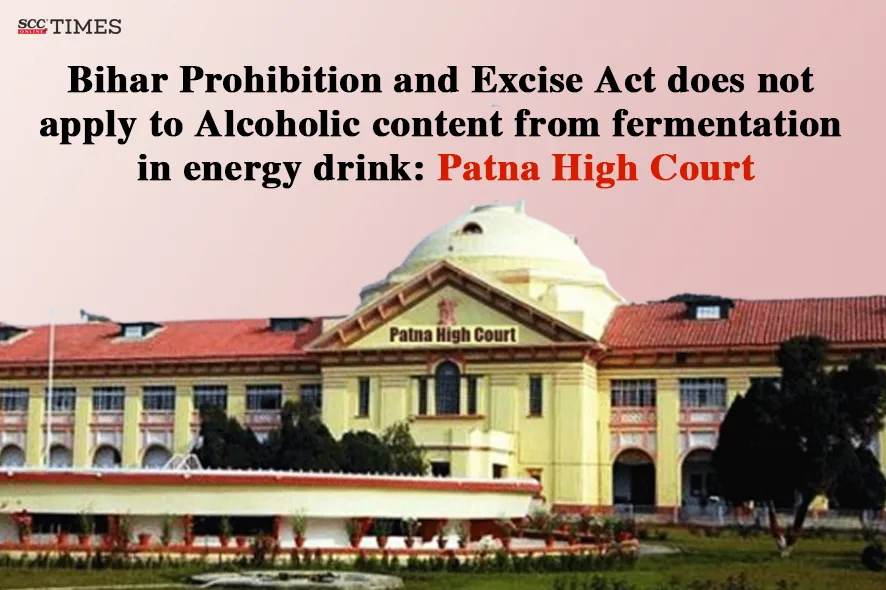Patna High Court: In a criminal writ petition filed by accused against the State, challenging the First Information Report (‘FIR’) lodged under the provisions of the Bihar Prohibition and Excise Act, 2016 for selling alcoholic beverages under the garb of energy drinks, a Single-Judge Bench of Madhuresh Prasad, J., quashed the FIR holding that the alcoholic content discovered in the seized energy drinks was attributable to fermentation which occurred due to the lapse of time, and not due to the product being an alcoholic substance per se on the date of seizure. The Court observed that Bihar Prohibition and Excise Act does not prohibit sale etc. of the non-alcoholic substances in conformity with the standard set by the Bureau of Indian Standards (‘BIS’). The Court further observed that the law is well settled that the offence is to be determined on the date of its commission and if on the date of seizure, the energy drink was not containing any alcoholic substance, the offence was not committed as per the provisions of the Bihar Prohibition and Excise Act.
Background
The accused, who operated a business distributing beverages including energy drinks. A news article in the newspaper on 09-02-2017 reported that a drink resembling beer was being sold under the name of an energy drink and contained 4% to 5% alcohol. Subsequently, the Excise Superintendent informed authorities that this energy drink was being sold and distributed by the accused. Acting on this information, an Excise Inspector and two sub-inspectors raided the premises of the accused. During a raid, excise officials seized products with names similar to popular beer brands, including WFM Super Strong 10000, WFM Super Strong 100000, Thousand Bolt, Kalalon Golden, and Kingfermer. The sales manager and the accountant were apprehended at the scene. Following the raid, an FIR was filed against the accused for offences punishable under Sections 419 and 420 of the Penal Code, 1860 and Sections 30(a), 35(c) and 32 of the Bihar Excise and Prohibition Act. The premises were also sealed. Based on tests from the Excise Chemist and the Forensic Science Laboratory, the seized drinks showed an alcohol content of up to 2.58% v/v. Aggrieved, the accused filed present writ application seeking to quash the FIR and have their premises unsealed.
Analysis and Decision
The Court perused Sections 2(3), 2(4) and 2(6) of the Bihar Prohibition and Excise Act. Section 2 (3) defines the word “alcoholic”, Section 2(4) defines the term “alcoholic beverage or portable liquor”, and Section 2(6) defines what is BIS.
The Court observed that,
“statutory provisions cannot be read in isolation to gather the aim and object of the legislature in bringing the Law in force. If the legislature would have intended to put complete prohibition even on non-alcoholic beverage as per the standard of BIS, there was no need to incorporate clarification in the form of definition of the word “alcoholic beverage or portable liquor” under Section 2(4) of the Act. Only definition under Section 2(3) of the Act was enough to fulfill the aforesaid desire.”
The Court noted that the Bihar Prohibition and Excise Act prohibit intoxicant or liquor containing alcohol of any strength and purity, as per the definition of ‘alcoholic’ under Section 2(3). Simultaneously, it does not prohibit sale etc. of the non-alcoholic substances in conformity with the standard set by the BIS in view of the definition and clarification contained under Section 2(4)(6) of the Act.
The ethyl alcohol content was not more than 0.4%v/v and only 0.2 % v/v to 0.4% v/v has been found by the chemical analyst. The Bihar Prohibition and Excise Act specifies that alcoholic beverages or portable liquors should confirm the standard fixed by BIS. The Court opined that the accused were selling non-alcoholic substance, according to the BIS standard. Hence, it could not be said that the accused have committed any offence under the Bihar Prohibition and Excise Act, or the FIR discloses any offence much less any cognizable offence said to be committed by the accused.
The Court further noted that if the FIR does not disclose any cognizable offence, it should be quashed as its continuation would amount to abuse of process of the law and failure of justice.
Further, the Court accepted the contention that no alcoholic content was found in earlier tests and the test conducted near about one month and fifteen days showed alcoholic content due to fermentation which had taken place due to span of time and for which the accused could not be held liable. The law is well settled that the offence is to be determined on the date of its commission and if on the date of seizure, the energy drink was not containing any alcoholic substance, the offence was not committed as per the provisions of the Bihar Prohibition and Excise Act.
In light of the afore-stated discussion the Court quashed the FIR.
[Kumari Punam v. State of Bihar, 2025 SCC OnLine Pat 3018, decided on 09-09-2025]
Advocates who appeared in this case:
For the Petitioners: Arvind Kumar Tewary, Akanksha Verma, Advocates
For the Respondents: Nalin Vilochan Tiwary, Advocate



